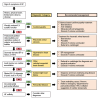Decentralization and Integration of Advanced Cardiac Care for the World's Poorest Billion Through the PEN-Plus Strategy for Severe Chronic Non-Communicable Disease
- PMID: 38549727
- PMCID: PMC10976983
- DOI: 10.5334/gh.1313
Decentralization and Integration of Advanced Cardiac Care for the World's Poorest Billion Through the PEN-Plus Strategy for Severe Chronic Non-Communicable Disease
Erratum in
-
Correction: Decentralization and Integration of Advanced Cardiac Care for the World's Poorest Billion Through the PEN-Plus Strategy for Severe Chronic Non-Communicable Disease.Glob Heart. 2024 Jun 26;19(1):54. doi: 10.5334/gh.1338. eCollection 2024. Glob Heart. 2024. PMID: 38947254 Free PMC article.
Abstract
Rheumatic and congenital heart disease, cardiomyopathies, and hypertensive heart disease are major causes of suffering and death in low- and lower middle-income countries (LLMICs), where the world's poorest billion people reside. Advanced cardiac care in these counties is still predominantly provided by specialists at urban tertiary centers, and is largely inaccessible to the rural poor. This situation is due to critical shortages in diagnostics, medications, and trained healthcare workers. The Package of Essential NCD Interventions - Plus (PEN-Plus) is an integrated care model for severe chronic noncommunicable diseases (NCDs) that aims to decentralize services and increase access. PEN-Plus strategies are being initiated by a growing number of LLMICs. We describe how PEN-Plus addresses the need for advanced cardiac care and discuss how a global group of cardiac organizations are working through the PEN-Plus Cardiac expert group to promote a shared operational strategy for management of severe cardiac disease in high-poverty settings.
Keywords: advanced cardiac disease; decentralization; heart failure; low-income country.
Copyright: © 2024 The Author(s).
Conflict of interest statement
The authors have no competing interests to declare.
Figures




References
-
- Callender T, Woodward M, Roth G, Farzadfar F, Lemarie J-C, Gicquel S, Atherton J, Rahimzadeh S, Ghaziani M, Shaikh M, Bennett D, Patel A, Lam CSP, Sliwa K, Barretto A, Siswanto BB, Diaz A, Herpin D, Krum H, Eliasz T, Forbes A, Kiszely A, Khosla R, Petrinic T, Praveen D, Shrivastava R, Xin D, MacMahon S, McMurray J, Rahimi K. Heart failure care in low- and middle-income countries: A systematic review and meta-analysis. PLoS Med. 2014; 11(8): e1001699. DOI: 10.1371/journal.pmed.1001699 - DOI - PMC - PubMed
-
- UnitedNations, Department of Economic and SocialAffairs, PopulationDivision. World urbanization prospects: The 2018 revision. 2019. https://population.un.org/wup/Publications/Files/WUP2018-Report.pdf.
-
- United National Development Programme and Oxford Poverty and Human DevelopmentInitiative. Global Multidimensional Poverty Index. 2022. https://ophi.org.uk/multidimensional-poverty-index/.
-
- Damasceno A, Mayosi BM, Sani M, Ogah OS, Mondo C, Ojji D, Dzudie A, Kouam CK, Suliman A, Schrueder N, Yonga G, Ba SA, Maru F, Alemayehu B, Edwards C, Davison BA, Cotter G, Sliwa K. The causes, treatment, and outcome of acute heart failure in 1006 Africans from 9 countries: Results of the Sub-Saharan Africa Survey of Heart Failure. Arch Intern Med. 2012; 172(18): 1386. DOI: 10.1001/archinternmed.2012.3310 - DOI - PubMed
Publication types
MeSH terms
Grants and funding
LinkOut - more resources
Full Text Sources
Medical

